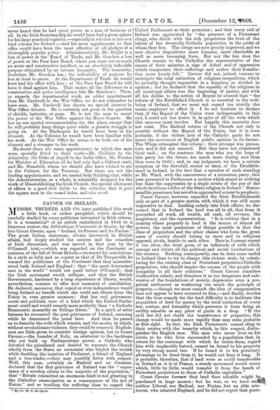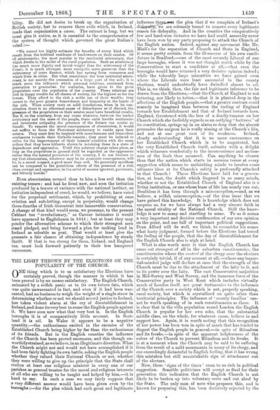CAVOUR ON TRTILAND.
MESSRS. TRUBNER AND CO. have published this week a little book, or rather pamphlet, which should be carefully studied by every politician interested in Irish reform. It is a translation* of an article contributed in 1844 to a Genevese review, the Bibb* otheque Universelle de Geneve, by the late Count Cavan; upon " Ireland, its Present and its Future." The great Italian statesman, always interested in British affairs, had deeply studied the sources and the remedies of Irish discontent, and was moved in that year by the O'Connell trial,—which was regarded on the Continent as ominous of the fall of Great Britain,—to record his convictions. In a style as lofty and as cogent as that of De Tocqueville he warned the politicians of the Continent that they misunder- stood both Ireland and England ; that " the most determined race in the world " would not quail before O'Connell ; that the Irish movement would collapse, and that the British Government, hardened by a long experience of liberty, would, nevertheless, venture to offer new measures of conciliation. He declared, moreover, that repeal or even independence would bring Ireland no benefit which she could not obtain from the Union in even greater measure ; that her real grievances, social and political, were of a kind which the United Parlia- ment could and would remedy more perfectly than " a Catholic Democratic Assembly on College Green." In a spirit of utter fairness be recounted the past grievances of Ireland, excusing while he denounced the penal laws. And then he passed on to describe the evils which remain, and the modes in which, without revolutionaryviolence, they could be removed. English- men are little given to consider foreign opinion, but to Count Cavour,—the founder of Italy, an aristocrat to the backbone who yet built up Parliamentary power, a Catholic who defeated the priesthood and desired to separate the Church wholly from the State, an economist who tripled the wealth while doubling the taxation of Piedmont, a friend of England and a free-trader,—they may possibly listen with respect. Well, this man, certainly no Radical and no Ctesarist, declared that the first grievance of Ireland was the " supre- macy of a worship odious to the majority of the population," that " Britain committed an enormous fault in not granting to the Catholics emancipation as a consequence of the Act of Union," and so teaching the suffering class to regard the
By Dr. W. B. Hodgson.
United Parliament as their protector ; and that every evil of Ireland was aggravated by " the presence of a Protestant clergy, who divide with the rich proprietors the fruit of the labour of the devotedly Catholic population in the midst of whom they live. The clergy are now greatly improved, and we now observe dispositions more humane, more charitable as well as more becoming lives. But not the less does the Church remain to the Catholics the representative of the causes of their miseries, a sign of defeat and of oppression which exasperates their sufferings and makes their humilia- tion more keenly felt." Cavour did not, indeed, venture to anticipate the total extinction of religious inequalities, which he probably thought impossible in a kingdom so divided in opinion ; but he declared that the equality of the religions in all municipal affairs was the beginning of justice, and with all his dislike to the notion of Repeal he avowed that " the reform of the Established Church is so essential to the well- being of Ireland, that we must not regard too strictly the means employed to effect it. I do not hesitate to declare that, if the Repeal of the Union were indispensable to this end, I could not but desire • it, in spite of all the evils which this measure must involve. But happily this necessity does not exist. The Radical reform of the Church not only is possible without the Repeal of the Union, but it is even probable, if the violent acts of the Catholic party do not, arrest the movement of English public opinion in its favour. The Whigs attempted this reform ; their attempt was prema- ture, and it did not succeed. But they have not abandoned their task ; on the contrary, the men who are the hope of this party for the future are much more daring now than they were in 1835 ; and, in my judgment, we have a certain symptom of the downfall, sooner or later, of the Establish- ment in Ireland, in the fact that a member of such standing as Mr. Ward, with the concurrence of a numerous party, this year presented to Parliament a motion which aimed at nothing less than the suppression by a single stroke of the pen of the whole factitious edifice of the State religion in Ireland." States- manlike prescience has not often approached sonear to prophecy.
Count Cavour, however, regarded the Irish Establishment only as part of a greater system with which it was still more imperative to deal. Looking calmly into Irish affairs, he dis- cerned that in Ireland the land was all in all, that from it proceeded all work, all wealth, all rank, all revenue, the magistracy, and the representation. " It is evident that in a, country where property in land is the source of almost all powers, the most pernicious of things possible is that the class of proprietors and the other classes who form the great mass of society should belong to races and to religions opposed, rivals, hostile to each other. Here is, I cannot repeat it too often, the fatal germ of an infinitude of evils which corrupt and vitiate all the political and social institutions of the country. Nothing, consequently, can be done more useful to Ireland than to try to change this vicious state, by substi- tuting for the existing class of Protestant proprietors Catholic proprietors, who should inspire the masses of the people with sympathy in all their relations." Count Cavour considers confiscation calmly, and dismisses it as too dangerous and sub- versive of the foundations of society, deprecates even a per- petual settlement as weakening too much the principle of property,—though we must remark the idea of compensation does not appear to have occurred to him,—and finally, decides that the true remedy for the land difficulty is to facilitate the acquisition of land for money by the total extinction of every law, custom, and formality which prevents it from being as swiftly saleable as any piece of goods in a shop. "If the civil law did not check the transference of properties, this change would be made more rapidly than may seem probable at first sight. In fact, the Irish Protestants cannot cling to their estates with the tenacity which, in this respect, distin- guishes the English race. The man who never lives on his estate, or he who lives surrounded by a population that, in return for the contempt with which he treats them, regard him with implacable hatred, cannot be bound to his property by very strong moral ties. - If he found it to his pecuniary advantage to be freed from it, he would not keep it long. It is probable, therefore, that if land were as easily transferable in Ireland as it is in' France, a steady movement would ensue which, little by little, would transfer it from the hands of Protestant proprietors to those of Catholic capitalists."
Count Cavour foresaw that land thus saleable might be purchased in large masses ; but he was, as we have sai neither Liberal, nor Radical, nor Fenian, but an able aris- tocrat, who admired England, and he did not regret that possi- bility. He did not desire to break up the organization of British society, but to remove those evils which, in Ireland, made that organization a curse. The extract is long, but we must give it entire, as it is essential to the comprehension of the system of thought which governed the great Italian's mind .-
"We cannot too highly estimate the benefits of every kind which result from the habitual residence of landowners on their estates. Of all aristocracies, the most popular is the territorial aristocracy, that which dwells in the midst of tho rural population. Such an aristocracy has much more dignity and moral weight than the aristocracy of the Court; it is much stronger, more energetic, more generous than the aristocracy of mere finance, which has sprung from commerce and which lives in cities. But what constitutes the true territorial aristo- cracy, is not merely the possession of a large part of the soil ; it is much more the influence which personal relations, continued from generation to generation for centuries, have given to the groat proprietors over the population of the country. These relations are rich in happy results for all classes of society, for the highest as for the lowest. They afford to the rich a noble use of their wealth ; they secure to the poor greater benevolence and humanity at the hands of the rich. When society rests on solid foundations, when in its con- stitution there is no abnormal cause of disturbance or of discord, the presence of the proprietors on their estates must have beneficial results. But if, on the contrary, from any cause whatever, between the landed aristocracy and the mass of the people, there exist hostile sentiments and inveterate antipathy, the presence of the former can confer no benefit. To remove the moral consequences of absenteeism, it would not suffice to force the Protestant aristocracy to reside upon their estates. They must first be inspired with more humane and benevolent sentiments towards their Catholic tenants ; they must be induced to strive for the improvement of their tenants' condition with the same ardour that they have hitherto shown in retaining them in a state of dependence and oppression. Until this salutary change takes place, as long as the proprietors in general shall be regarded as the oppressors rather than the natural protectors of tho country, I do not hesitate to say that absenteeism, whatever may be its economic consequences, will be, in a moral respect, a good more than evil. No pecuniary sacrifices can be compared to the pernicious effects of the presence of a rich class, corrupt and oppressive, in the midst of masses ignorant, passionate, and bitterly hostile."
Even absenteeism seemed thus to him a less evil than the existing tenure ; and had he lived now, and seen the irritation produced by a tenure at variance with the national instinct, an irritation independent of creed, he would, we believe, have voted for the perpetual settlement, which, by prohibiting at once eviction and sub-letting, except in perpetuity, would change three-fourths of Irish discontent into immovable conservatism. A change of that kind would seem, we presume, to the present Cabinet too "revolutionary," as Cavour intimates it would have appeared to Englishmen in 1844 ; but at least they may ponder the alternative scheme to which their strongest men stand pledged, and bring forward a plan for making land in Ireland as saleable as peat. That would at least give the peasants a fair chance of obtaining independence by steady thrift. If that is too strong for them, Ireland, and England too, must look forward patiently to their less hampered successors.



































 Previous page
Previous page